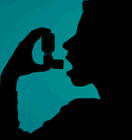|
ASTHMA
 Asthma is a common ailment that cannot be permanently
cured. It is caused by inflammation in the airways which causes the
muscle
lining to constrict
making the diameter of the airways narrower and increasing mucus production
which leads to coughing. This then makes it harder to breathe with
a lack of sufficient oxygen. The person then begins to cough and
wheeze
with a high breathing rate. Asthma is a common ailment that cannot be permanently
cured. It is caused by inflammation in the airways which causes the
muscle
lining to constrict
making the diameter of the airways narrower and increasing mucus production
which leads to coughing. This then makes it harder to breathe with
a lack of sufficient oxygen. The person then begins to cough and
wheeze
with a high breathing rate.
Asthma is not contagious and is usually inherited or genetically passed.
Described as an allergic reaction, it takes place in the respiratory
system – the mouth, nose, lungs, bronchi, airways (bronchioles)
and the windpipe (trachea). It is most likely to occur when a person
is in their teenage years, when it is also easier to identify. Cases
of Asthma can range from mild to severe with differing symptoms depending
on who the person is. In some cases, Asthma can re-occur at an older
age for those people who had it as children. Due to the difficulty in
breathing due to Asthma, it is sometimes confused in older people with
heart disease or diseases such as bronchitis or emphysema.
Asthma is on the increase with an increase in, smoking, indoor allergens,
air pollutants and changes in diet.
What are the symptoms of Asthma?
Different types of symptoms are dependent on each individual person
The typical symptoms include: wheezing; coughing; turning blue in
complexion; breathlessness.
Mild symptoms include: irritating cough, wheezing, exercise, chest infection
or the cold.
Moderate symptoms include: breathlessness; wheezing - most of the time this
develops during the night or in the morning.
Severe symptoms include: strong wheezing, difficulty in breathing, 'tight chest'.
What triggers Asthma?
Factors
that trigger Asthma can include: Infections - colds, chest infections,
coughs.
Allergens - pollen, mould, certain foods, house dust,
hay fever.
Allergies - against animals i.e. dogs, cats, horses.
Certain Medications - Aspirin, anti-inflammatory painkillers,
beta-blockers.
Emotions - stress, laughing, emotionally upset
Smoking - tobacco smoke, wood smoke, pollution - there
is a link between the increase in pollution and the increase in number
of asthma cases. Exercise - for some people exercise can increase asthma
symptoms, but generally, mild exercise is a good way to treat Asthma.
Irritants - sprays, strong odours, paints, perfumes,
varnishes.
Indigestion Gastroesophageal Reflux (GER or Reflux) is the medical
term used to describe a condition in which stomach contents, food
and gastric acid, frequently flow back up out of the stomach "regurgitate" into
the oesophagus.
Asthma attacks can either start suddenly or can take a long time
to develop. Mild, Moderate or severe attacks are difficult
to predict and can lead to death if untreated. Moderate
and mild asthma attacks
include spiting, coughing, restlessness, feeling tired
and trouble sleeping. Severe Asthma attacks include breathless,
trouble communicating, turn blue in complexion at finger
tips and on
the
face, neck muscles
as well as the area around the ribs become tight, begin
to lose consciousness.
A 'Second Wave' attack, though unlikely, is worse and much
more dangerous than the first attack as the air tubes
carry on narrowing
with lack
of sufficient oxygen and more difficulty in breathing
- this can last several days or weeks.
Asthma treatments
There is no currently known cure for asthma. Nevertheless,
there are some safe and effective treatments available
that can help
to control
the symptoms. There are two main kinds of asthma treatment
that doctors currently prescribe as inhalers, they are
called relievers
and preventers.
|



![]()
 Asthma is a common ailment that cannot be permanently
cured. It is caused by inflammation in the airways which causes the
muscle
lining to constrict
making the diameter of the airways narrower and increasing mucus production
which leads to coughing. This then makes it harder to breathe with
a lack of sufficient oxygen. The person then begins to cough and
wheeze
with a high breathing rate.
Asthma is a common ailment that cannot be permanently
cured. It is caused by inflammation in the airways which causes the
muscle
lining to constrict
making the diameter of the airways narrower and increasing mucus production
which leads to coughing. This then makes it harder to breathe with
a lack of sufficient oxygen. The person then begins to cough and
wheeze
with a high breathing rate.